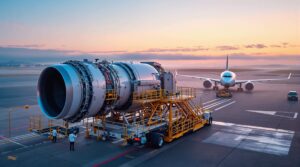Firstly, it’s crucial to understand that aircraft inspectors play a pivotal role in ensuring the safety and airworthiness of airplanes. These professionals meticulously examine every inch of an aircraft, from its engines to its avionics systems, to guarantee compliance with stringent aviation regulations.
Now, let’s zoom in on the financial aspect of this career. On average, aircraft inspectors command a respectable salary. The remuneration is influenced by various factors such as experience, location, and the type of aircraft they specialize in inspecting.
Experience, undoubtedly, is a significant player in the salary game. Those with years of hands-on experience and a proven track record tend to earn significantly more. To put it bluntly, the more seasoned the inspector, the heftier the paycheck.
Geographical location also comes into play. In regions with a high demand for aviation services or a higher cost of living, aircraft inspectors typically receive more lucrative offers. Major aviation hubs around the world often attract skilled inspectors with tempting financial packages.
Now, let’s break down the numbers without further ado. According to industry reports, the median annual salary for aircraft inspectors hovers around the $70,000 mark. However, it’s essential to note that this figure can vary widely. Those in the top percentile, often with extensive experience and expertise, can command salaries exceeding $100,000 or more.
Additionally, the type of aircraft inspected can impact the paycheck. Inspecting larger and more complex aircraft may lead to higher compensation due to the increased skill and knowledge required for the job. It’s a simple equation of supply and demand – specialized skills command higher pay.
For a more comprehensive view, let’s delve into a
| Experience Level | Average Salary |
|---|---|
| Entry Level (0-2 years) | $50,000 – $60,000 |
| Mid-Level (2-5 years) | $60,000 – $80,000 |
| Experienced (5+ years) | $80,000 – $100,000+ |
It’s evident that the trajectory of earnings for aircraft inspectors follows a positive curve with increasing experience.
Aircraft inspector salary duties and requirements
An aircraft inspector plays a crucial role in ensuring the safety and airworthiness of aircraft. They are responsible for meticulously examining various components and systems of an aircraft to identify potential issues, defects, or deviations from safety standards. The aircraft inspector salary is influenced by factors such as experience, qualifications, and the type of aircraft they work with.
One of the primary duties of an aircraft inspector is to conduct thorough inspections of aircraft, including the airframe, engines, avionics, and other critical components. They use specialized tools and equipment to assess the condition of parts, checking for wear and tear, corrosion, or any other signs of damage. Their meticulous scrutiny is essential to prevent potential accidents and ensure compliance with aviation regulations.
Additionally, aircraft inspectors must document their findings in detailed reports, outlining any discrepancies or issues discovered during the inspection process. This documentation is crucial for maintenance teams and regulatory authorities to address and rectify the identified problems. Strong attention to detail and effective communication skills are essential for this aspect of the job.
The requirements for becoming an aircraft inspector typically include a combination of education, training, and experience. Many inspectors have a background in aviation maintenance and hold relevant certifications, such as an Airframe and Powerplant (A&P) certificate issued by the Federal Aviation Administration (FAA). Some may also pursue additional certifications in specialized areas, enhancing their expertise in fields like avionics or composites.
Furthermore, aircraft inspectors must stay updated on the latest advancements in aviation technology, regulations, and safety standards. Attending regular training sessions and workshops is common to ensure that inspectors remain well-informed and capable of addressing emerging challenges in the dynamic aviation industry.
The salary of an aircraft inspector varies based on factors such as the level of experience, geographic location, and the type of employer. On average, however, aircraft inspectors can expect a competitive salary, reflecting the critical nature of their role in maintaining the safety and integrity of the aviation industry.
Aircraft maintenance inspection profitable aviation jobs
In the dynamic world of aviation, aircraft maintenance inspection plays a pivotal role in ensuring the safety and reliability of airborne vehicles. The job of an aircraft inspector goes beyond routine checks; it is a gateway to profitable aviation jobs and offers a fascinating insight into the intricate workings of cutting-edge aircraft.
For those aspiring to enter this field, understanding the job outlook is crucial. The aviation industry, with its constant evolution and expansion, presents a promising career advancement opportunities for skilled and dedicated aircraft inspectors. These professionals are the guardians of flight safety, conducting meticulous inspections to identify and rectify any potential issues before they escalate.
The job outlook for aircraft inspectors is notably positive, driven by the perpetual growth of the aviation sector. As technology continues to advance, aircraft become more sophisticated, demanding highly skilled inspectors to ensure compliance with stringent safety standards. This trend opens up a plethora of career advancement opportunities for individuals looking to climb the professional ladder.
One of the defining features of this profession is its profitable aviation jobs. Aircraft inspectors are in high demand, and their specialized skill set commands competitive salaries. Airlines, maintenance facilities, and aerospace companies actively seek qualified inspectors to uphold their commitment to safety and regulatory compliance.
Moreover, the role of an aircraft inspector extends beyond routine inspections. These professionals are integral to the development and implementation of preventative maintenance programs. By identifying potential issues before they manifest, inspectors contribute significantly to the longevity and efficiency of aircraft, making their role not just crucial but also highly valued.
Aspiring individuals considering a career in aircraft maintenance inspection should also be aware of the diverse career advancement opportunities within the field. Beyond the initial role, inspectors can specialize in specific aircraft types or even transition into management positions. Continuous learning and staying abreast of industry advancements are key factors for those looking to capitalize on career advancement opportunities.
Becoming an aircraft inspector step-by-step guide
If you’re eyeing a career in aviation and intrigued by the prospect of working in a high-demand field with minimal education needed, becoming an aircraft inspector might just be the perfect route for you.
Unlike many professions in the aviation industry, the path to becoming an aircraft inspector doesn’t demand a lengthy academic journey. In fact, a high school diploma or equivalent is often sufficient to kickstart your career in this highly sought-after field.
The first step on your journey is to build a strong foundation in mathematics and physics during your high school years. While these subjects may not be directly related to aviation, they form the basis for understanding the technical aspects of aircraft systems and structures, which is crucial for an effective aircraft inspector.
After completing your high school education, the next step is to pursue a specialized training program for aircraft inspection. Look for programs accredited by aviation authorities or institutions recognized within the industry. These programs provide in-depth knowledge of aircraft systems, regulations, and inspection techniques, laying the groundwork for your future career.
During your training, you’ll delve into topics such as aircraft materials, manufacturing processes, and aviation safety regulations. This hands-on experience is invaluable, offering you the chance to apply theoretical knowledge in real-world scenarios, preparing you for the challenges of being an effective aircraft inspector.
Additionally, consider obtaining certifications that enhance your credibility and marketability. Certifications such as the Airframe and Powerplant (A&P) certificate are highly regarded in the aviation industry and can significantly boost your career prospects.
Networking plays a crucial role in the aviation industry, and as you progress in your training, make efforts to connect with professionals already working as aircraft inspectors. Attend industry events, join online forums, and participate in workshops to expand your network and gain insights from experienced individuals in the field.
Once you’ve completed your training and possibly secured relevant certifications, the job market eagerly awaits your entry. The aviation industry’s constant growth ensures a sustained high demand for skilled aircraft inspectors. Airlines, maintenance facilities, and regulatory bodies actively seek qualified individuals to ensure the safety and compliance of their aircraft.





